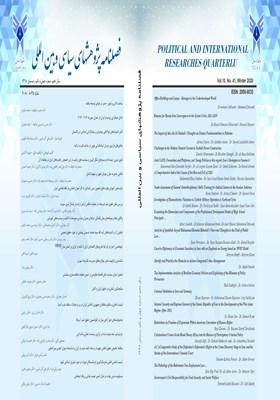دیپلماسی اجبار در شرایط تحریم های اقتصادی ایران با تکیه بر انرژی بر اساس مدل SWOT
محورهای موضوعی : مجله پژوهش های سیاسی و بین المللی
کلید واژه: تحریم, تحلیل SWOT, دیپلماسی اجبار, اقتصاد انرژی,
چکیده مقاله :
مریم هاتفی[1]- مریم خانی[2] تاریخ دریافت: 1/6/1398- تاریخ پذیرش: 30/7/1398 چکیده: نظر به روند گسترده شدن، متنوع شدن و افزایش هوشمندانه تحریم ها، بررسی دیپلماسی اجبار در شرایط تحریم با تکیه بر انرژی به ویژه در صنعت نفت که در حال حاضر یکی از ابزارهای فشار از سوی دولت اجبار کننده ایالات متحده آمریکا بر دولت اجبار شونده جمهوری اسلامی ایران می باشد؛ تنها با نگاه به استراتژی های کلان در اقتصاد سیاسی این دو کشور با تحلیل چگونگی اعمال تحریم های ایالات متحده آمریکا در فضای دیپلماسی اجبار بر اقتصاد انرژی ایران میسر خواهد شد. این مقاله در تلاش است با استفاده از ماتریس تحلیل swot بر اساس ماهیت تحلیلی و اکتشافی و شناسایی نقاط قوت، ضعف، فرصت ها و تهدید های دولت اجبار کننده بر اقتصاد انرژی دولت اجبار شونده، راهبردهای برون رفت از این محدودیت ها را در قالب چهار گروه به مدیران صنعت نفت ارائه نماید. [1] - دکتری تخصصی، جغرافیای سیاسی، دانشکده ادبیات، علوم انسانی و اجتماعی، واحد علوم و تحقیقات، دانشگاه آزاد اسلامی، تهران، ایران : نویسنده مسئول dr.maryamhatefi@gmail.com [2] - دانشجوی دکتری، جامعه شناسی اقتصادی و توسعه، دانشکده علوم اجتماعی، واحد تهران مرکزی، دانشگاه آزاد اسلامی، تهران، ایران m_kh_900@yahoo.com
Mohammad Reza Davtalab Vazifeh[1] Ali Asghar Kazemi Zand[2] Mehdi Zakerian[3], Hamid Ahmadi[4], Abstract With the coming to power of Donald Trump in the United States, he takes a different approach to the level of extremist action on various global and regional issues, which has created security threats for various actors. This new attitude has also influenced Iran as the main focus of developments in the Middle East. Trump administration pursues step-by-step confrontation with Iran on security issues in the Middle East. The plan to create an Arab NATO is also at the heart of Trump's Middle East policy and forms the purpose of this article. In this regard, the main question in this article is, "What are the goals of the Trump administration in the Middle East and what obstacles will it face?" In response to this fundamental question, the paper's hypothesis is formulated that “the goal of forming an Arab NATO appears to be to limit Iran's regional influence and to create an Arab-Islamic bloc with the presence of Israel and even the United States." The findings show that the main obstacles to the Arab NATO plan are the Qatar crisis and the internal divisions of the Arab countries over regional issues, the weakening of Saudi Arabia's position in the West, the differences in regional readings of terrorism, and the divide in the Arab world over how to confront it. Iran and the intensification of Shiite-Sunni religious conflicts and divisions in the Middle East. [1] PhD student, International Relations, Faculty of Law, Theology and Political Science, Islamic Azad University, Tehran, Iran [2] Professor and Faculty Member, Department of International Relations, Faculty of Law, Theology and Political Science, Science and Research Branch, Islamic Azad University, Tehran, Iran (Corresponding Author) [3] Associate Professor and Member of the Department of International Relations, Faculty of Law, Theology and Political Science, Islamic Azad University, Tehran, Iran. [4] Professor and Faculty Member, Faculty of Law and Political Science, University of Tehran, Tehran, Iran
_||_

